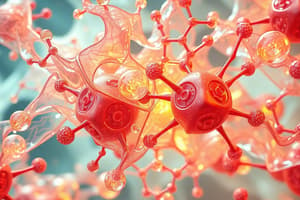Podcast
Questions and Answers
What are the four fundamental states of matter?
What are the four fundamental states of matter?
- Solid, liquid, air, and plasma
- Solid, liquid, gas, and plasma (correct)
- Solid, liquid, gas, and energy
- Solid, liquid, air, and energy
How are the molecules in a solid characterized?
How are the molecules in a solid characterized?
- Loosely packed with the least amount of kinetic energy
- Loosely packed with high kinetic energy
- Closely packed with the least amount of kinetic energy (correct)
- Closely packed with high kinetic energy
What distinguishes a solid from a liquid?
What distinguishes a solid from a liquid?
- A solid expands to fill the entire available volume like a gas
- A solid has loosely packed molecules
- A solid can be compressed with little pressure
- A solid does not flow to take on the shape of its container (correct)
What are the two types of solid based on atomic arrangement?
What are the two types of solid based on atomic arrangement?
What is the branch of physics that deals with solids called?
What is the branch of physics that deals with solids called?
Flashcards are hidden until you start studying
Study Notes
States of Matter
- There are four fundamental states of matter: solid, liquid, gas, and plasma.
Characteristics of Solids
- In a solid, molecules are closely packed and have a fixed position in space.
- The molecules in a solid vibrate in place, but do not change their position.
Solid vs Liquid
- The key difference between a solid and a liquid is the arrangement of molecules.
- In a solid, molecules are closely packed and have a fixed shape, while in a liquid, molecules are close together but are free to move past each other.
Types of Solids
- There are two types of solids based on atomic arrangement: crystalline and amorphous solids.
- Crystalline solids have a regular, three-dimensional arrangement of atoms, while amorphous solids have a random arrangement of atoms.
Physics of Solids
- The branch of physics that deals with solids is called solid-state physics.
- Solid-state physics studies the behavior of solids and their properties, such as mechanical, thermal, electrical, and magnetic properties.
Studying That Suits You
Use AI to generate personalized quizzes and flashcards to suit your learning preferences.




